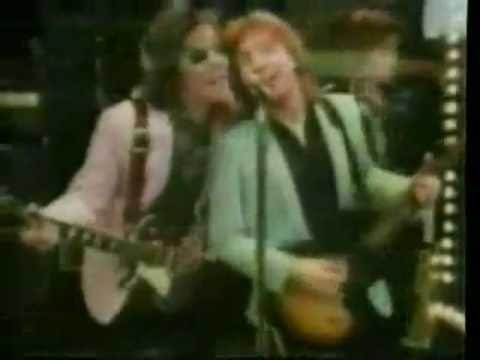"Starry Eyes" by THE RECORDS
A quick dive into the ne plus ultra power pop breakup song and what makes it special.
“Get me out of your starry eyes and be on your way”
A power pop band simply needs all the tunefulness of the British Invasion and the right amount of rock oomph -- just enough, say, to keep them from getting bottled off the stage at a rugby bar. It’s so simple and so joyous when it clicks. It’s also largely uncool. Since its emergence in the 70s, power pop has been adjacent to glam, punk, and new wave, which were all ways of describing people and the fashion sense that went with their favorite music. You’d never describe a person as “power pop,” except maybe the square-looking guy at a rock show who’s really into the hooks. For power pop, the song is enough. It’s everything.
“Power pop” was coined by Pete Townsend, perhaps extemporaneously, to describe The Who’s style of music around the time of The Who Sell Out. It gelled into a genre in 1972 to codify debuts by Big Star and The Raspberries, along with Todd Rungren’s breakthrough, Something/Anything. It also covers almost all garage bands that were too poppy for garage rock, what Dave Edmunds described at the time as “kids' music, really, just four-four time and good songs.” By the back half of decade, power pop’s punchy, shorter songs came to fit under the UK punk’s rock ‘n’ roll reformation. The drums got pushed to the front of the mix; immediacy and energy ran roughshod over intricate harmonies, but it was still all about the hooks. That sound, the apex of it —that’s The Records in 1978.
With its hint of sweetness, power pop is great for capturing the first blush of love, where everything seems in harmony. It works just as well in contrast as a breakup song, which is what “Starry Eyes” is. A good bit of its charm is in how matter of fact it is: John Wicks, whose name must be fun at airport security, dispassionately sings lines like “I don’t want to argue, there’s nothing to say.” Wicks’ vocals are a bit thin to begin with and here are sunk low in the mix, barely even with the drums and guitar; it’s easy to gloss over most lyrics and hear the song as an imagined story of a starry-eyed fan who didn’t see the boy behind the guitar. But the truth is that it’s far more salty than bittersweet: This song is somebody getting fired.
This breakup is with the band’s first manager, who fucked off to the south of France for a two-week vacation while the band was trying to get out of a bad record deal attached to Wicks and drummer Will Burch’s former band, The Kursaal Flyers. There’s no metaphor or mystery about it. It’s hilariously direct, which punk allowed you to be, and amusingly petty, which a lot of punk ultimately became. The song issues a series of complaints like a dad grumping at a teen for not taking out the trash.
While you were in the pool, we were meeting with the boys upstairs
Talking to the money men and carrying out affairs
We had no time for cocktails or working up a tan
The boys have all been spoken to, the writ has hit the fan
The story has it that Burch wrote out the lyrics in a fit of pique and thrust them at Wicks in their rehearsal space. Wicks had just heard Eddie & The Hot Rods’ “Do Anything You Wanna Do” on the radio, and cranked out a facsimile with some jangly chords. The song was done in five minutes and sounds it, in the best way. They cut the song as a demo, which got them signed to Virgin Records. The label released it as a single as-is.
The Records were hired to back teenage singer Rachael Sweet for Stiff Records’ Be Stiff ‘78 tour, where they opened with a set of their own. The band brought copies of the single along; the DJ at the Bottom Line in New York put “Starry Eyes” on, and as Wicks recalls, “next thing we knew a DJ at WNEW was playing it three times a day.” That early airplay partly accounts for why “Starry Eyes” was bigger in the U.S., but its chiming, rocked-up Byrds guitar leads are also a staple of US power pop, from Big Star’s “September Gurls” and The Flaming Groovies’ “Shake Some Action” on to ‘80s bands like Let’s Active (“Every Word Means No”).
Still, few songs are the lightning in a bottle that “Starry Eyes” is. The Records weren’t trying to be power pop or anything other than a good rock band of its time. The song still sounds immediate. It works if you like punk, new wave, alternative rock, or any guitar/bass/drums music played at an insistent tempo over the last 50 years. Even knowing that the song is about dispatching a manager who lacked a sense of urgency, it somehow feels romantic. Maybe it’s in that first 25 second build up to the lyrics as the drums race forward and the piercing guitar lead climbs like a kite blown loose from a child’s hand — a madeleine bite that transports you to when a song alone could be enough, be everything.
30 Song Playlist
What started as a short power pop playlist got too fun to reign in. It’s not intended to be definitive, because defining things can be the enemy of joy. It’s pretty much chronological and geographical after the first couple. Let’s hope Spotify lets you play it in order. Thanks to Alley, whose two suggestions help tie the whole thing together.
Put it on while cleaning the house. It’ll go faster.
Please Share
That’s how most people discover newsletters. It’s also my primary motivation for doing this, to share music in a way not afforded by other platforms. It’s just a click of a button but one that would mean a great lot to me.
Picpoul Season
Picopol de Pinet is one of those coastal French white wines that wake up the palate and cut through the torpor of the doggiest of the dog days of summer. That trademark acidity is what gave the grape its name, translating loosely as “hen-peck” for its prickly effect on the lips in what we can assume were pre-Chapstick days. The wine also boasts good minerality and stone fruit notes, which makes it great with any and all seafood. Domaine la Grangette Picpoul de Pinet Poule de Pic comes from a domaine that dates back to the middle ages and is a solid bargain at around $17. The cute chicken on the label is also on the cork, so you have that to look forward to. Florez Oyster Pal Picpoul Dunnigan Hills, from California’s burgeoning natural wine scene, is a much bolder wine. Extended time on the lees gives it a fuller body, but there’s still a lightness and freshness on the palate and that bracing acidity that makes it such a great dance partner with seafood and summer aperitif.
You’ve spoken and asked for continued wine recommendations. Okay, it was just one of you, but that’s enough for me to keep ‘em coming.
Thanks for reading,
Scott




